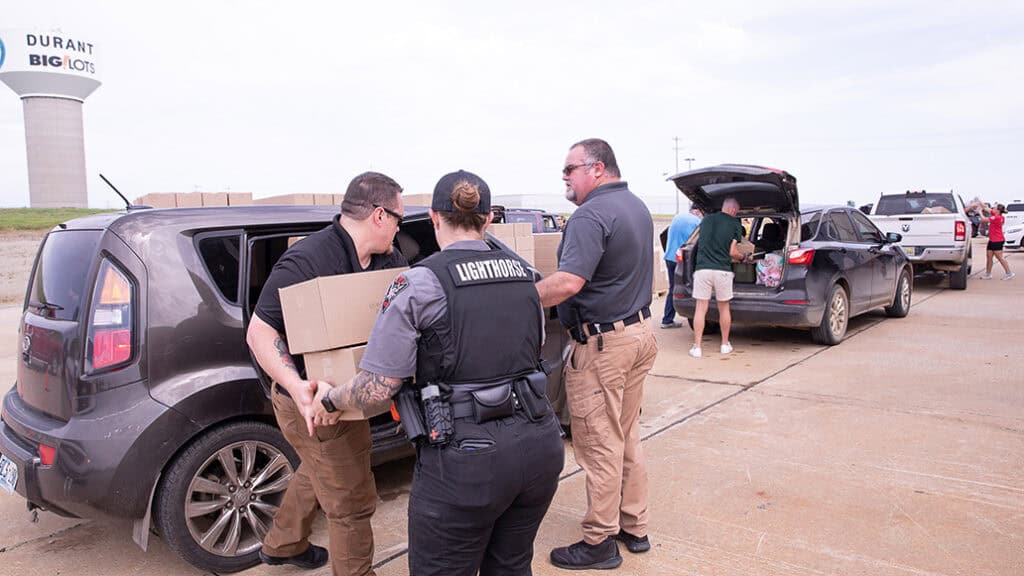
According to the United States Department of Agriculture (USDA), Oklahoma, Texas, Arkansas, Louisiana, Mississippi, Kentucky, and South Carolina had food insecurity above the U.S. average between 2021 and 2023.
Large portions of the Choctaw Nation lie in USDA-designated food deserts. These food deserts are census tracts with both low-income and low access, meaning they have a high poverty rate or a family income below a certain threshold. When a significant portion of this population lives more than a certain distance from a supermarket or large grocery store, the USDA will designate it as a food desert.
With summer in full swing, many children who normally eat two to three times at school could go hungry, living in one of these food deserts. With help from a grant from the USDA, the Choctaw Nation is assisting these families with food for their children.
The Summer Food Service Program provides grab-and-go, shelf-stable meals to children aged 1-17.
The program operates at 11 sites, offering weekly boxes with five breakfasts, five lunches, and three milk cartons, enough milk for the week.
Senior Director of Health Service Food and Nutrition Programs Shelly Rector said, “We live in a food desert across the reservation. Inflation is at an all-time high, and parents struggle during the summer feeding their children.”
There are no applications or qualifying guidelines; the Summer Food Service Program is open to anybody, regardless of tribal affiliation. “Summer Food Service is first come, first serve at any of the locations, and it’s a drive-through service. People just drive through and tell us their kids’ names, and we load their car with the boxes,” said Rector.

District Nine Councilman James Dry often volunteers to help load cars at the Bryan County location.
“This is for all kids, regardless of tribal affiliation,” said Dry. “It just helps make sure that these kids get nutritious meals throughout the summer.” Dry emphasized that some families are on a fixed income, with many grandparents raising their grandchildren.
Qualifying families can also utilize the benefits of a separate program that mirrors the Special Supplemental Nutritional Program for Women, Infants and Children (WIC) food package. The Summer EBT program provides qualifying families with $40 per child per month for grocery benefits from mid-May through early August. This federally funded program is open to everyone who meets eligibility requirements, regardless of tribal affiliation, and is an equal opportunity provider.
To qualify for Summer EBT, children must live within the Choctaw Nation and be at least one of the following:
- Enrolled in a participating school district in grades pre-K – 12 within the Choctaw Nation Reservation
- Receive free or reduced-cost meals at school. (If the child/children were on the school’s list, they are automatically qualified and enrolled in the program. If nothing has been received yet, verifying the mailing address with the program manager may be required.)
- Free and reduced-cost meal programs offered by schools operating Community Eligibility Provision (CEP) may have additional criteria to qualify.
- Enrolled in a charter school or homeschooled and have a household member receive specific state or federal benefits.
- Enrolled in the foster care system.
Specific income guidelines may also need to be met. Families can apply online or get more information about the Summer EBT program. Families can also call 580-916-9239 with any questions.
“It’s important that the Choctaw Nation has these grant programs where we can step in, and we can assist households to ensure that children are getting food that they need,” Rector said.
Last year, the Summer Food Service Program provided over 700,000 meals. According to Rector, they aim to serve a million this year and are well on their way.
“In [the first] three weeks, they have already distributed 140,660 meals,” said Rector.
Dry is very happy to see the cars of both tribal and non-tribal members loaded with food.
“It means the world to me because that’s what the Choctaw Nation is all about,” said Dry. “Not only serving our tribal members but giving back to the community.”